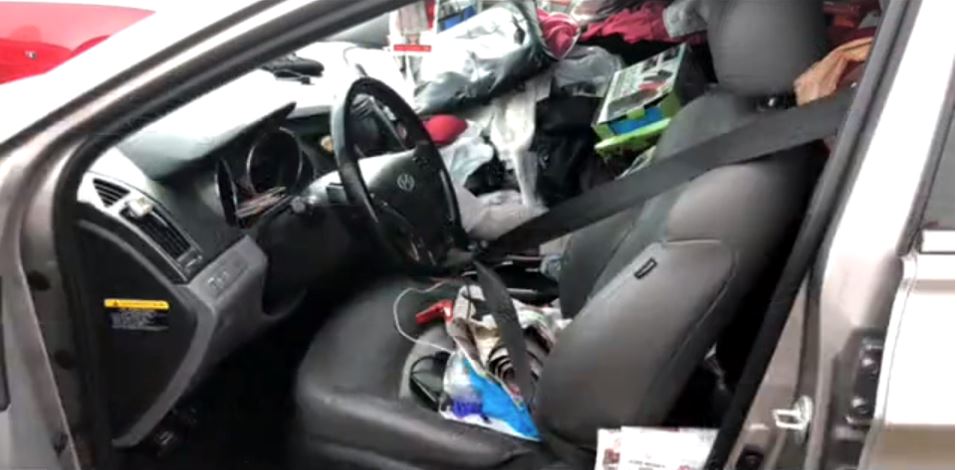Editorial
Cockroaches scurry for cover under the seats as you open the door of the car that was just repossessed earlier that morning. The sun has been up for a few hours and the car’s interior has fermented it’s contents that greet you with a sour rotting smell. Rubber gloves on and trash bag in hand, you begin the inventory of a half-eaten “Egg MCMuffin”, dirty diapers, assorted papers, shirts and a lot of items belonging to the borrower that makes you wonder why is all of this in their vehicle? This is, no doubt, sometimes the most unpleasant part of the repossession process.
So, why do you do it? You have to! It’s the law. As a legal compromise, the law also allows you to charge for the removal, inventory and storage of this property. So, why would you not charge for this?
Because the Lender or Forwarder tells you that you can’t. Why? Because they were told by the CFPB that you can’t charge the borrower.
In the CFPB’s Supervisory Highlights, Issue 13 dated 10-31-16, they state;
2.2.1 Repossession fees and refusal to return property
To secure an auto loan, a borrower gives a creditor a security interest in his or her vehicle. When a borrower defaults, the creditor can exercise its right under the contract and repossess the secured vehicle. Depending upon state law and the contract with the consumer, auto loan servicers may in certain cases charge the borrower for the cost of repossessing the vehicle.
Borrowers often have personal property and belongings in vehicles that are repossessed. These items often are not merely incidental, but can be of substantial emotional attachment or practical importance to borrowers, which are not appropriate matters for the creditor to decide for itself. State law typically requires auto loan servicers and repossession companies to maintain borrowers’ property so that it may be returned upon request. Some companies charge borrowers for the cost of retaining the property.
can be of substantial emotional attachment or practical importance to borrowers, which are not appropriate matters for the creditor to decide for itself. State law typically requires auto loan servicers and repossession companies to maintain borrowers’ property so that it may be returned upon request. Some companies charge borrowers for the cost of retaining the property.
In one or more recent exams, Supervision found that companies were holding borrowers’ personal belongings and refusing to return the property to borrowers until after the borrower paid a fee for storing the property. If borrowers did not pay the fee before the company was no longer obligated to hold on to the property under state law (often 30-45 days), the companies would dispose of the property instead of returning it to the borrower and add the fee to the borrowers’ balance.
CFPB examiners concluded that it was an unfair practice to detain or refuse to return personal property found in a repossessed vehicle until the consumer paid a fee or where the consumer requested return of the property, regardless of what the consumer agreed to in the contract. Even when the consumer agreements and state law may have supported the lawfulness of charging the fee, examiners concluded there were no circumstances in which it was lawful to refuse to return property until after the fee was paid, instead of simply adding the fee to the borrower’s balance as companies do with other repossession fees. Examiners observed circumstances in which this tactic of leveraging personal situations for collection purposes was extreme, including retention of tools essential to the consumer’s livelihood and retention of personal possessions of negligible market value but of substantial emotional attachment or practical importance for the consumer.
Examiners also found that in some instances, one or more companies were engaging in the unfair practice of charging a borrower for storing personal property found in a repossessed vehicle when the consumer agreement disclosed that the property would be stored, but not that the borrower would need to pay for the storage. In these instances, based on the consumer contracts, it was unfair to charge these undisclosed fees at all.
 In response to examiners’ findings, one or more companies informed Supervision that it ceased charging borrowers to store personal property found in repossessed vehicles. In Supervision’s upcoming auto loan servicing exams, examiners will be looking closely at how companies engage in repossession activities, including whether property is being improperly withheld from consumers, what fees are charged, how they are charged, and the context of how consumers are being treated to determine whether the practices were lawful.
In response to examiners’ findings, one or more companies informed Supervision that it ceased charging borrowers to store personal property found in repossessed vehicles. In Supervision’s upcoming auto loan servicing exams, examiners will be looking closely at how companies engage in repossession activities, including whether property is being improperly withheld from consumers, what fees are charged, how they are charged, and the context of how consumers are being treated to determine whether the practices were lawful.
That does not mean that you don’t have a right to charge the lender for this service! Your right to these fees was won in a Federal Circuit court case; Nadalin v. Automobile Recovery Bureau, Inc., – F.3d – (1999 WL 130194, 7th Cir.) or 169 F. 3d 1084 (7th Cir., 1999). Unless that ruling is overturned in another Federal Circuit Court of Appeals or the Supreme Court, it is the law of the land.
CARS Certification founder Joe Taylor, provides the following advice in regards to managing personal property;
- The contract between the creditor and the debtor should contain a consent clause. This is a responsibility of the creditor.
- The personal property contained in the vehicle at the time of repossession should be immediately inventoried (preferably by the recovery agent who performed the repossession) showing date and time of the inventory and signed by the person who completed the inventory.
- The personal property must be protected.
- The debtor must be notified in a timely manner and method of redeeming the personal property and given a reasonable time period for redemption.
- A “reasonable” fee may be charged to the debtor for this service.
Unfortunately, far too many agencies have succumbed to this pressure and are performing this rotten part of the job for free. The Lenders and Forwarders are telling them it is included in the repossession fee. That is, a repossession fee that did not increase to compensate for the lost income for this task.
Forwarders are telling them it is included in the repossession fee. That is, a repossession fee that did not increase to compensate for the lost income for this task.
Vehicle storage – None!
Key Fees – None!
Personal Property Fees – None!
Yet again, no increase in repossession fees while they strip away from the ancillary fees that agencies used to be able to use to offset the flat repossession fees.
Folks, the Lenders and forwarders don’t care about your business and you know it. They never will. It’s not personal, it’s business. They only care about beating their budget numbers and receiving their next bonus for keeping your income down. That’s a fact and you know it. They are profiting from keeping your wages down. If you could make an easy $10K to $25K simply by not letting the fees increase and consistently pushing to get more for less on the backs of people who don’t have the ability to say “No”, wouldn’t you?
You have a right to this fee and most borrowers will pay it without batting an eye. Perhaps an addendum to your existing agreements should be provided allowing you to charge for this fee with the option of billing the Lender in the event of borrower opposition. That’s a legal question and one that would need to be worked out and agreed to by all parties until the Lenders get around to revising the contracts to explicitly include the right to charge for this fee. Unfortunately, without the need, they won’t do a thing.
be provided allowing you to charge for this fee with the option of billing the Lender in the event of borrower opposition. That’s a legal question and one that would need to be worked out and agreed to by all parties until the Lenders get around to revising the contracts to explicitly include the right to charge for this fee. Unfortunately, without the need, they won’t do a thing.
Why do they get away with this? Because far too many of you in the industry let them. You know who you are and you are damaging your own livelihood as well as that of everyone else in the industry. It’s your own fault. The sad thing is, some of you are hooked on the volume. You don’t know how to stop and are afraid your entire business will fail if you stop now.
In the meanwhile, you continue to sift through dozens of bags of filthy personal property while being accused, sometimes in small claims court, of stealing from these people who you had to give the property to for free. Frequently angry people who spit at you and call you names. Armed people who could just as easily shoot you. All stick and no carrot! Why? You don’t have to!
It’s your business, fail now or fail later, you need to develop an exit strategy from this madness and execute it before it is too late.
Kevin Armstrong
Editor, CUCollector.com
Allied Finance Adjusters (AFA)
American Recovery Association (ARA)
California Association of Licensed Repossessors (CALR)
Time Finance Adjusters (TFA)
Recovery Specialists Insurance Group (RSIG)











More Stories
Colorado Bill Aims to Severely Impact All Repossession Operations
Today is Fallen Agents Day – 2026
From Auction Cutting to Field Programming: The Structural Shift No One Budgeted For
Bad Apples in the Repossession Industry
Why Self-Help Repossession Is Taken for Granted — and Why Losing It Would Hurt Consumers Most
A Necessary Distinction: Financial Oversight vs. Financial Control